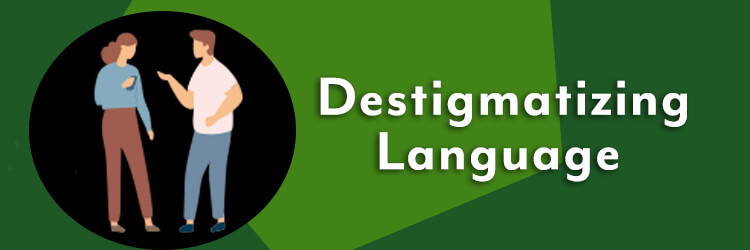[vc_row][vc_column][vc_column_text]Our main goal with all of the content we create is to destigmatize addiction and mental health. That means we use specific language to talk about these issues. Because stigma often thrives in silence, we wanted to be transparent about why we use certain terms.
In general, it’s respectful of a person’s humanity to use person-first language. For instance, instead of saying someone is a “Bipolar person,” we would say they are a “person with Bipolar Disorder.” Referring to someone as a Bipolar person erases all of their other qualities. Using the phrase “person with Bipolar disorder” notes their humanity before their mental health diagnosis.
The Diagnostic and Statistical Manual of Mental Disorders (DSM)—the main text mental health clinicians use to make diagnoses—released its most recent version in 2013, the DSM-5. In the DSM-IV, Alcohol Abuse and Alcohol Dependence were two separate disorders.
The DSM-5 put them under one umbrella called Alcohol Use Disorder (AUD). The same is true for substance use; what used to be two classifications of Substance Abuse and Substance Dependence became Substance Use Disorders (SUDs).
The authors of the DSM believed these classifications were not helpful; “abuse” was supposed to be mild, but often presented as severe. But the new terms are also much less stigmatizing. Usually we associate the word “abuse” with someone committing a harmful act. While one can argue addiction causes self-destruction, people don’t become addicted in order to hurt others. Substance Use Disorder is a respectful way of acknowledging the condition.
When I was in active addiction, someone referred to me as a “substance abuser.” It felt like they were only seeing me as my addiction and calling me a bad person.
The more we make people feel guilty for their addiction with the language we use, the less likely they are to seek help. Inciting guilt does not make people get sober. In fact, it often creates a cycle of use, guilt, and more use to numb the guilt.
Most people are accustomed to using the words “alcoholic” and “addict.” These are a little more complicated. Those words are widely accepted in Alcoholics Anonymous and Narcotics Anonymous fellowships, respectively. But they are not an official diagnosis. You won’t hear medical professionals diagnose someone as an addict or alcoholic. Instead, they use Alcohol Use Disorder or Substance Use Disorder.
Language matters. When you have an addiction and you hear the term “substance abuse” over and over, you start to internalize that addiction is wrong—that you are wrong. Awareness of the words we use is a simple way to move the conversation forward. It doesn’t take much to alter your language slightly in service of destigmatizing addiction and mental health.
If you are struggling with a substance use or mental health disorder, there is hope. TruHealing Centers is open throughout the COVID-19 crisis, with hospital-grade sanitization of our facilities and telehealth options, so that you can feel safe in treatment. At recovery centers across the country, we will help you thrive in long-term recovery. Call an admissions specialist at 410-593-0005.[/vc_column_text][/vc_column][/vc_row]









